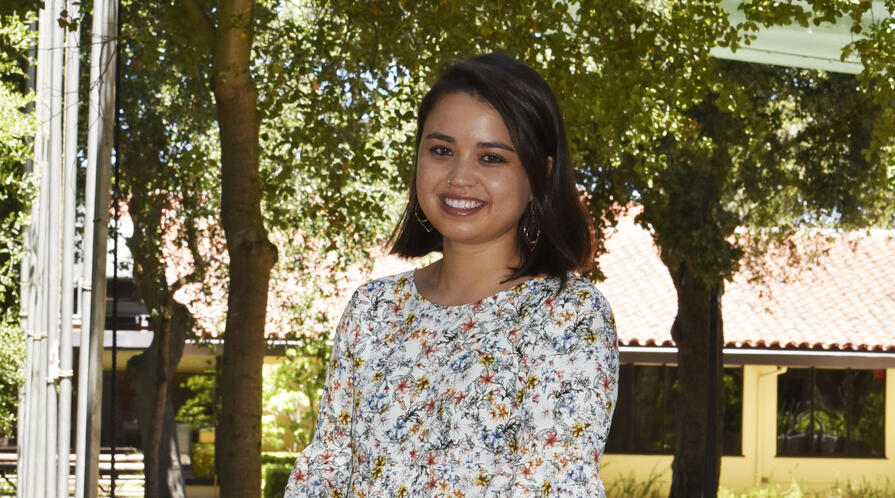CDDRL honors’ student awarded top thesis prize


Stanford’s Center on Democracy, Development, and the Rule of Law (CDDRL) is proud to announce that undergraduate honors student Whitney McIntosh received the highest distinction for her thesis at Stanford. Each year, the David M. Kennedy Prize is awarded to four outstanding honors theses in the humanities, social sciences, engineering and the applied sciences. McIntosh’s thesis “France and the Internationalization of Security: A Conceptual History of Security During the Interwar Years (1919-1933),” was researched and written during her participation in CDDRL’s Fisher Family Honors Program in Democracy, Development and Rule of Law.
This is the third Kennedy prize awarded to a CDDRL honors student in the past five years.
Under the supervision of Stephen Stedman, CDDRL’s deputy director and director of the Fisher Family Honors Program, McIntosh analyzed the meaning of security in France in the aftermath of World War I. While her thesis was historic in nature, it lessons resonate with contemporary French politics, underscoring the tensions between globalization and polarization in Western democracies.
“The thesis is an exemplary piece of multidisciplinary research that uses methods and insights from history, political science,linguistics and English,” said Stedman. “Many of Whitney’s sources are drawn from French archives and memoirs, and it is thrilling to see an undergraduate deftly move between French and English passages.”
Launched in 2010, the Fisher Family Honors Program trains a cohort of Stanford students to research and write an original thesis on a topic influencing the field of democratic development. Students work with faculty mentors, attend weekly seminars and attend Honors College in Washington, DC for a chance to interact with policymakers and gain practical knowledge to inform their thesis.
CDDRL Mosbacher Director Francis Fukuyama supported McIntosh’s nomination for the prize: “Marshalling an impressive trove of sources Whitney crafted an elegant and compelling explanation for shifting conceptions of security, and made a rigorous case for understanding the importance of security as a term and concept whose meaning adapts to suit needs of powerful actors and states,” said Fukuyama.
McIntosh is planning to continue and expand her research in the future. In this short Q&A she discusses the genesis of her honor thesis research, shares tips for future honors students and shares how honored she was to receive this award.
1. How did you develop your interest in the topic?
At the beginning of my sophomore year, I started working as a research assistant for Professor Stephen Stedman on his project exploring the evolution of the concept of security over the twentieth century. That same year, Professor Stedman and I also began a research collaboration with Professor Mark Algee-Hewitt and Erik Fredner at the Stanford Literary Lab to look deeper into this question with both qualitative and quantitative methods. In this process, Professor Stedman and I began to talk more about how and when the concept re-emerged in the twentieth century. We began to hypothesize that it had arisen in France after the First World War. As I have some French language ability, I applied for and received a Global Mentored Fellowship grant from the Freeman Spogli Institute to travel to Paris that summer to conduct archival research on the topic. It was in the heart of the national archives in Paris that I began to think deeply about the complexities and intricacies of my research question, and found the necessary archival documents to support an honors thesis.
2. Are you planning to pursue this further and how?
Due to time constraints, my honors thesis was limited to the years from 1919 to 1933. However, in my conclusions I realized that the period from 1933 to the beginning of World War II is an incredibly interesting time for France, as France was stricken by immense political fragmentation and social unrest, and this period may have had huge consequences on later conceptualizations of security. Given the time, I would be very interested in extending my research into this period to see how the concept evolved.
More broadly, my honors thesis gave me the opportunity to examine the way that cultures and contexts shape the way that political concepts emerge and change over time. I hope to continue to research how culture and politics interact, inform and influence each other in any future graduate work.
3. What does it mean to you to get this award?
It is an incredible honor to receive the Kennedy Thesis Prize for my honors thesis. It has been a wonderful opportunity to again express my thanks to those who guided me throughout the process, such as my advisor Professor Stedman. I am also glad to bring greater attention to CDDRL’s Fisher Family Honors Program which has been one of the most intellectually fulfilling experiences of my Stanford career, through its broad network of academics, inspiring thesis cohort and incredible program for furnishing honors work.
4. How did Honors College help with your research?
Our CDDRL Honors College in Washington D.C. was an incredible opportunity to meet with experts in a range of fields and policy areas. It really helped me to develop a better mental framework for posing successful research questions and then conducting the research necessary to answer them. Apart from learning from experts, it was also an important time to engage with and bounce ideas off my peers for our honors thesis.
5. What would be your tip for future applicants, who want to get the most out of Honors College?
For future applicants, I would advise you to be assertive, engage with the people that you meet, and keep in contact those who are relevant to your field. It’s immensely important to start thinking about your thesis early (and not procrastinate!), so it’s essential to use Honors College to gain as much guidance as soon you can and to think deeply about the direction you want to go in. Also—trust your peers! The cohort is a widely skilled and talented group, with many ideas that will help you along the way.
